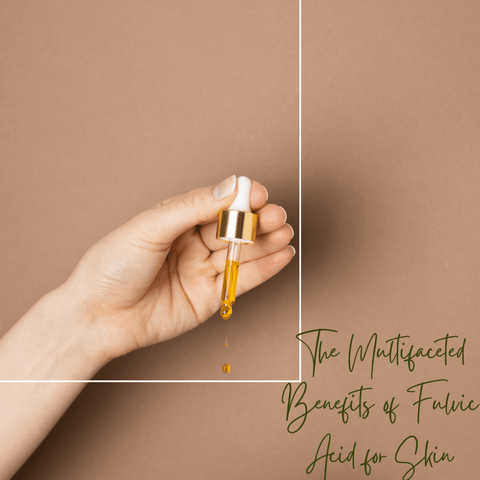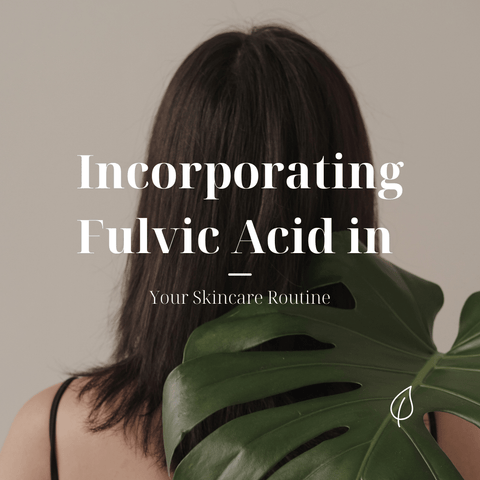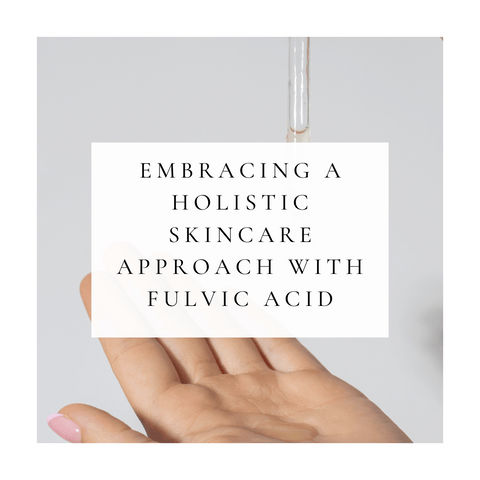Fulvic acid, a less well-known yet effective substance, is crucial to skincare. It has several skin-friendly properties and is gaining popularity in the skincare and cosmetics industries. In this article, let's unravel the secrets of fulvic acid and examine its crucial function in skincare.
Unveiling Fulvic Acid: A Skincare Breakthrough

The discovery of fulvic acid as a breakthrough in skincare reveals a fascinating natural substance with several advantages for the skin. This relatively unknown substance has acquired popularity because of its distinctive qualities and potential to completely alter skincare regimens. Here is a closer look at fulvic acid as a breakthrough in skincare, including its natural origin, key skincare advantages, antioxidant strength, enhanced hydration, skin whitening, anti-inflammatory action, benefits for detoxification, cell regeneration, formulation variety, and expert advice. Products containing fulvic acid can be a useful addition to your skincare routine, whether you're trying to treat aging issues, increase hydration, or have a brighter complexion. Fulvic acid is anticipated to play a more significant role in assisting people in achieving healthier and more vibrant skin as the skincare industry continues to develop.
Origins and History of Fulvic Acid
A naturally occurring organic substance called fulvic acid can be found in soil, sediment, and water. It is a byproduct of the environment's helpful microbes breaking down organic debris. Here's a basic overview of the origins and history of fulvic acid:
-
Natural Origins: Microbes break down organic elements found in soil, such as dead plants, bacteria, and other organic matter, to produce fulvic acid. This process of breakdown is a normal part of how ecosystems recycle nutrients.
-
Geological Origins: Ancient soil, silt, and even some rock formations can all contain fulvic acid. Geological processes over millions of years have converted organic materials into fulvic acid.
-
Historical Use in Traditional Medicine: For millennia, numerous cultures have used fulvic acid-rich substances in their traditional medical practises. Indigenous and traditional healers understood these compounds' medicinal potential, particularly for their capacity to improve nutrient absorption and promote general health.
-
Scientific Discovery: The scientific community began to pay attention to fulvic acid in the 19th century. Researchers first investigated its chemical properties and potential applications in agriculture and medicine.
-
Agricultural Use: In agriculture, fulvic acid has long been utilised as a soil conditioner and a plant growth promoter. It is an important tool for sustainable farming methods because of its capacity to increase soil fertility and plant nutrient uptake.
-
Modern Skincare and Wellness Applications: Fulvic acid has gained popularity recently due to its possible uses in health and skincare. Due to its antioxidant, moisturising, and detoxifying qualities, it is increasingly used in supplements and cosmetic products.
-
Scientific Research: Ongoing scientific research is revealing the many health benefits of fulvic acid, including its ability to improve skin health, reduce inflammation, and function as a potent antioxidant.
-
Global Popularity: In the global health and wellness market, dietary supplements and skincare items based on fulvic acid are becoming more and more well-liked. Its natural origin and adaptability have aided in its rising popularity.
-
Sustainable and Natural Ingredient: Fulvic acid is in line with the growing demand for natural and sustainable ingredients in a variety of industries, including skincare and nutrition.
The Science of Fulvic Acid in Skincare
Understanding fulvic acid's chemical makeup, characteristics, and mechanisms of action is essential for using it as a valuable ingredient in skincare products that enhance skin health and attractiveness. Here is a closer look at the scientific basis for fulvic acid's use in skincare, including its chemical makeup, molecular size, antioxidant properties, hydration and moisturization, detoxification, anti-inflammatory effects, skin barrier function, cell regeneration, collagen production, synergistic effects, clinical studies, safety, and tolerability. Its small molecular size and wide range of advantages make it a useful substance for enhancing skin health and resolving a variety of skin issues. Fulvic acid is a common ingredient in contemporary skincare formulas as scientific study continues to reveal its possibilities.
The Multifaceted Benefits of Fulvic Acid for Skin

Fulvic acid is a flexible and valuable ingredient in skincare products since it provides the skin with a variety of advantages. Its special qualities treat different skin problems and improve the condition of the skin as a whole. The numerous advantages of fulvic acid for the skin are as follows:
-
Antioxidant Protection: The strong antioxidant fulvic acid aids in the removal of free radicals from the skin. This defence lessens oxidative stress, which can cause fine lines and wrinkles as well as early aging.
-
Hydration and Moisturization: By enhancing the skin barrier, fulvic acid improves the skin's capacity to retain moisture. It assists in forming a shielding film on the skin's surface, stopping moisture loss, and maintaining the skin's hydration.
-
Detoxification: Due to its chelating abilities, fulvic acid can attach to heavy metals and poisons on the skin's surface and aid in their elimination. This detoxification process can clean the skin and lessen the effects of toxins in the environment.
-
Anti-Inflammatory Effects: It is advantageous for relaxing and calming irritated skin because it has anti-inflammatory qualities. Acne and eczema are two common skin diseases characterised by redness and inflammation, both of which can be alleviated by fulvic acid.
-
Skin Barrier Support: Fulvic acid helps to support the skin's natural barrier function. A strong skin barrier is required for defence against outside aggressors, maintaining moisture balance, and avoiding skin problems.
-
Cell Regeneration: Fulvic acid encourages cell renewal and replacement. This may result in enhanced skin texture and smoother, younger-looking skin.
-
Collagen Production: According to certain research, fulvic acid may encourage the skin's natural creation of collagen. Increased collagen production can aid in maintaining a young appearance because it is essential for skin elasticity and suppleness.
-
Brightening and Even Skin Tone: By using fulvic acid to reduce the appearance of age spots, sun spots, and hyperpigmentation, you can achieve a brighter and more even skin tone.
-
Enhanced Absorption: Because of its tiny molecular size, fulvic acid can efficiently permeate the skin. It can increase the effectiveness and absorption of other active components in cosmetic products.
-
Synergistic Effects: When used with other skincare compounds, fulvic acid can increase the effectiveness and benefits of those ingredients in treating a variety of skin issues.
-
Clinical Studies: Even though additional study is required, several early investigations and clinical trials have yielded encouraging findings about the effects of fulvic acid on the skin's hydration, anti-aging, and anti-inflammatory properties.
-
Versatile Formulations: Serums, creams, masks, and cleansers are just a few of the skincare products that include fulvic acid, making it suitable for a range of skincare regimens and preferences.
Neutralizing Damage: The Antioxidant Aspect of Fulvic Acid
Fulvic acid is an essential component of skincare and general health because of its antioxidant qualities, which are crucial in preventing damage from free radicals. An examination of fulvic acid's antioxidant properties and its significance for skin and body protection follows:
-
Free Radicals and Oxidative Stress: Highly reactive compounds with unpaired electrons are known as free radicals. They can also be brought into the body via outside sources like UV radiation, pollution, and tobacco smoke. They are created naturally in the body during metabolic activities. Free radicals can generate oxidative stress when they interact with bodily molecules, which can result in cellular damage, aging, and a number of health problems.
-
Antioxidants and Their Role: Antioxidants are molecules that neutralise free radicals by donating an electron to stabilise them. In doing so, antioxidants prevent the chain reactions that lead to cellular damage and oxidative stress.
-
Fulvic Acid as an Antioxidant: By scavenging free radicals, fulvic acid, a powerful antioxidant, can help shield the body and skin from oxidative stress. Its antioxidant activity helps to prevent premature aging, minimise the look of fine lines and wrinkles, and keep skin healthy.
-
Skin Protection: Fulvic acid-containing skincare products can offer the skin antioxidant defence against environmental stresses like UV radiation and pollution when applied topically. This defence reduces the possibility of skin damage, age spots, and accelerated aging brought on by exposure to free radicals.
-
Cellular Health: The antioxidant effects of fulvic acid extend beyond the skin, improving cellular health in general. It might aid in preventing cellular damage and supporting the body's natural healing mechanisms by lowering oxidative stress.
-
Combating Inflammation: Oxidative stress and inflammation are closely related concepts. Because of its anti-inflammatory effects, fulvic acid is advantageous for skin diseases like acne and eczema.
-
Skin Brightening: By minimising the oxidative damage that causes dark spots and uneven pigmentation, fulvic acid's ability to neutralise free radicals can help to produce a skin tone that is brighter and more even.
-
Anti-Aging Effects: Fulvic acid is an antioxidant that can help slow down the aging process by defending the skin's collagen and elastin fibres. This improves the firmness and elasticity of the skin.
-
Collagen Preservation: The structural protein collagen gives the skin its firmness and suppleness. The antioxidant qualities of fulvic acid can aid in maintaining collagen integrity and lessen the appearance of drooping skin.
-
Overall Health Benefits: By lowering oxidative stress throughout the body, fulvic acid's antioxidant activity supports general health. This could lead to increased health and a decreased risk of chronic conditions brought on by oxidative damage.
A Boost to Skin Structure: Enhancing Collagen Synthesis
Fulvic acid has the potential to improve collagen synthesis, which is essential for preserving the firmness, suppleness, and structure of the skin. Fulvic acid supports this crucial aspect of skin health in the following ways: by promoting collagen production, offering necessary nutrients, providing antioxidant protection, maintaining skin integrity, reducing wrinkles and fine lines, improving skin texture, improving overall skin health, preventing collagen breakdown, and providing long-term advantages. Fulvic acid can help with enhanced collagen production and skin structure as part of your skincare regimen. This makes fulvic acid a valuable component in anti-aging and skin-rejuvenating treatments over time since it can lead to tighter, more elastic, and youthful-looking skin.
Smooth, Ageless Beauty: Combatting Wrinkles and Fine Lines
A frequent skincare objective is to reduce wrinkles and fine lines, and fulvic acid can be a helpful ally in achieving smooth, youthful beauty. How fulvic acid works to lessen the appearance of wrinkles and fine lines is as follows:
-
Collagen Production: Collagen is a protein necessary for preserving the flexibility and firmness of skin, and fulvic acid aids in its creation. Promoting collagen formation can help lessen the appearance of wrinkles and fine lines because collagen levels drop with aging.
-
Antioxidant Protection: The antioxidant properties of fulvic acid aid in preventing free radical damage to the skin. Free radicals can damage collagen fibres and cause premature aging, including wrinkle development.
-
Hydration and Moisture: By enhancing the skin barrier, fulvic acid improves the skin's capacity to retain moisture. Skin that is adequately moisturised seems plumper and smoother, which helps make fine wrinkles less noticeable.
-
Anti-Inflammatory Effects: Wrinkles may become more obvious when there is inflammation. The anti-inflammatory effects of fulvic acid can help lessen swelling and redness, which can help conceal small wrinkles.
-
Detoxification: Fulvic acid can cleanse the skin by attaching to toxins and pollutants that are present on the skin's surface. This can help to improve skin clarity and lessen the elements that make wrinkles and fine lines more noticeable.
-
Skin Regeneration: Fulvic acid encourages skin cell regeneration and turnover, which can result in smoother, younger-looking skin. Wrinkles might appear less noticeable as new skin cells replace damaged ones.
-
Enhanced Absorption: Fulvic acid can increase the effectiveness and absorption of other skincare products when coupled with them. This combination can improve the overall anti-aging effects of your skincare regimen.
-
Even Skin Tone: A more even skin tone can be achieved by reducing hyperpigmentation and age spots with fulvic acid. As a result, wrinkles and fine lines may appear less noticeable next to a smoother complexion.
-
Consistent Use: Consistent skincare routines are generally necessary to achieve smooth, youthful looks. Over time, consistent usage of products containing fulvic acid can result in small but observable improvements.
-
Sun Protection: The development of wrinkles and premature aging are both directly related to sun exposure. To shield your skin from UV deterioration, combine fulvic acid with broad-spectrum sunscreen.
-
Lifestyle Factors: The benefits of skincare products, particularly those containing fulvic acid, can be enhanced by leading a healthy lifestyle that includes a nutritious diet, enough hydration, frequent exercise, and stress management.
-
Professional Guidance: Consult a dermatologist or skincare expert for tailored advice and treatments that address certain wrinkle and fine-line issues.
You can effectively fight wrinkles and fine lines by incorporating fulvic acid into your skincare regimen along with other anti-aging techniques. Being persistent and patient is crucial because changes could take some time. You can retain your ageless beauty and get skin that is smoother and more youthful-looking with the appropriate method.
Incorporating Fulvic Acid in Your Skincare Routine

The inclusion of fulvic acid in your skincare regimen can be beneficial for a number of skin problems. Here is a comprehensive guide on how to do it successfully, including advice on how to conduct a patch test, choose the right product, clean the skin, apply a fulvic acid product, wait for it to absorb, moisturise, and protect yourself from the sun. Individual skin types and sensitivities differ, so it's important to pay attention to how your skin reacts to fulvic acid and modify your regimen as necessary. Fulvic acid can help produce healthier, more luminous skin with regular use and the correct product choice.
Identifying Quality Fulvic Acid Products
Finding high-quality fulvic acid products is essential to guarantee you get the most advantages for your skin. When assessing the calibre of fulvic acid products, keep the following important variables in mind:
-
Ingredients and Formulation: Verify that fulvic acid is a prominent and clearly listed ingredient by looking at the product's ingredient list. Seek out items with fulvic acid included among the first few ingredients, as this denotes a higher concentration.
-
Purity and Sourcing: Choose items that get their fulvic acid from reliable and environmentally friendly sources. Organic matter and natural processes, such as the microbial and plant degradation of plants, should provide high-quality fulvic acid.
-
Manufacturing Standards: Choose products from manufacturers who follow GMPs and other quality control guidelines. These criteria guarantee the production process's consistency and purity.
-
Packaging: Due to its sensitivity to air and light, fulvic acid may lose some of its purity. To prevent the fulvic acid from being exposed to outside influences, choose items that are packaged in opaque, sealed containers.
-
Third-Party Testing: Reputable companies frequently use independent testing to confirm the excellence and purity of their goods. On their websites or product labels, look for items that show the findings of independent lab testing.
-
Reviews and Reputation: Check the reputation of the brand by reading consumer reviews. Customers' favorable reviews and industry recognition are signs of high-quality products.
-
Concentration and Dosage: Take into account the product's fulvic acid content. Although higher concentrations could have more powerful effects, it's important to use them in accordance with the suggested dosage to prevent skin sensitivity.
-
Allergen-Free and Cruelty-Free: Make sure the product is free of common irritants and allergens. If you're worried about animal testing, look for products from companies that practise cruelty-free business practises.
-
Transparency: Brands that are open and honest about their sourcing, production, and testing practises are frequently more reliable.
-
Skin Compatibility: Perform a patch test when trying a new fulvic acid product to ensure that it is compatible with your skin and doesn't cause any adverse reactions.
-
Specific Skin Concerns: Pick fulvic acid products that are designed to treat the issues with your particular skin, such as anti-aging, hydration, acne, or brightness. To meet different needs, various extra substances may be used in various goods.
-
Consultation with a Dermatologist: Before introducing fulvic acid products into your routine, talk with a dermatologist if you have any specific skin disorders or concerns. They can make tailored recommendations based on your skin type and requirements.
Usage Guidelines and Precautions
It is critical to follow usage guidelines and take measures while using fulvic acid products in your skincare routine to ensure your safety and maximise the benefits. Here are some suggestions and safeguards to remember:
-
Patch Test: Perform a patch test on a tiny area of skin, such as the inside of your wrist or behind your ear, before applying any fulvic acid product to your face. Check for any adverse responses such as redness, itching, or irritation after 24-48 hours. If you develop any irritation, stop using the product.
-
Start Slowly: If you're new to fulvic acid, start with a lesser frequency of application to allow your skin to adjust. Begin with every other day or a couple of times per week and gradually increase usage as your skin becomes accustomed to the product.
-
Follow Product Instructions: Always follow the manufacturer's recommended usage directions. Pay close attention to any specified application, dose, and frequency requirements.
-
Avoid Sensitive Areas: Applying fulvic acid products to sensitive parts of the face, such as the eyes and mucous membranes, should be avoided. To avoid irritation, use caution around the eyes.
-
Sun Protection: Fulvic acid might make your skin more sun-sensitive. Apply a broad-spectrum sunscreen with SPF while using fulvic acid products in your morning routine to protect your skin from UV damage. This is essential for avoiding sunburn and other skin damage.
-
Use in an Evening Routine: Consider introducing fulvic acid into your evening skincare routine if you like to use it in larger quantities. This permits the substance to benefit your skin without exposing it to the sun.
-
Hydration: Fulvic acid can help the skin retain moisture, but it's still necessary to apply a moisturiser to seal in hydration and keep the skin barrier healthy.
-
Complementary Products: Consider the other products in your skincare routine. Although fulvic acid can be used with a wide range of chemicals, it is critical to ensure compatibility with other active components, especially if you are utilising different products.
-
Consistency: To get the best results from fulvic acid, you must utilise it consistently. Include it in your routine, and give your skin time to adapt and develop.
-
Consult a Dermatologist: Consult a dermatologist before incorporating fulvic acid into your skincare routine if you have specific skin issues, existing skin diseases, or allergies. They can provide you personalised advice and make sure it's safe for your skin type.
-
Quality Products: Choose fulvic acid from renowned brands that place a premium on quality, transparency, and safety. Look for items that have detailed ingredient lists and evidence of third-party testing.
-
Avoid Overuse: Excessive or frequent use of fulvic acid might cause skin sensitivity or irritation. Follow the product manufacturer's recommended dosage and frequency.
By following these guidelines and taking precautions, you can safely and effectively incorporate fulvic acid into your skincare routine, helping you achieve healthier, more radiant skin while minimising the risk of adverse reactions.
Embracing a Holistic Skincare Approach with Fulvic Acid

Adopting a holistic skincare strategy with fulvic acid entails adding this natural element into your skincare routine while taking your overall health and lifestyle decisions into account. Understand your skin type and concerns, select high-quality fulvic acid products, personalise your skincare routine, use complementary ingredients, make holistic lifestyle choices for sun protection, diet and nutrition, hydration, stress management, consult a professional, be patient, monitor your skin, and promote holistic well-being. You can obtain healthier, more beautiful skin and general well-being by incorporating fulvic acid into a well-rounded skincare routine and making excellent lifestyle choices.
















